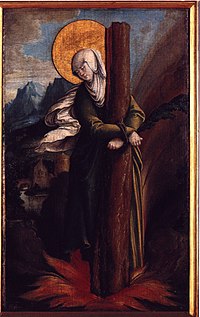St Afra
| Saint Afra | |
|---|---|

Saint Afra, by the Master of Messkirch, c. 1535-1540
|
|
| Martyr | |
| Born | Augsburg, Rhætia |
| Died | c. 305 |
| Venerated in | Roman Catholic Church, Antiochian Orthodox Christian |
| Major shrine | St. Ulrich's and St. Afra's Abbey, Augsburg |
| Feast | August 5 (sometimes listed as August 6, August 7) |
| Attributes | depicted being burnt to death |
| Patronage | Augsburg; converts; martyrs; penitent women |
Saint Afra (died 304) was a Christian martyr and a saint of Augsburg. Her feast day is August 5.
Although many different accounts of her life exist, the most widely known is The Acts of St. Afra, which dates from the Carolingian period (8th century AD). In the opinion of most critics this is compilation of two different accounts, the story of the conversion of St. Afra, and the story of her martyrdom. The former is of later origin, and is merely a legendary narrative of Carlovingian times, drawn up with the intention of connecting with St. Afra the organization of the church of Augsburg.
In the late 3rd century, her pagan family journeyed from Cyprus to Augsburg. Afra was dedicated to the service of the goddess, Venus, by her mother, Hilaria. According to this source, she was originally a prostitute in Augsburg, having gone there from Cyprus, maybe even as the daughter of the King of Cyprus. She is reputed either to have run a brothel in that town or worked as a hierodule in the Temple of Venus. As the persecution of Christians during the reign of Roman Emperor Diocletian began, Bishop Narcissus of Girona (in Spain) sought refuge in Augsburg and lodged with Afra and her mother, Hilaria. Through his teachings, Bishop Narcissus converted Afra and her family to Christianity.
She continued to hide the bishop from the authorities. When it was learned that Afra was a Christian, she was brought before Diocletian and ordered to give glory to the pagan idols. She refused, and was condemned to death by fire on a small island in the Lech River, with her remains being buried at a distance from the place of her martyrdom. Her mother and her maids (viz., Ligna, Eunonia, and Eutropia) later suffered the same fate, for interring her in a burial vault.
...
Wikipedia
